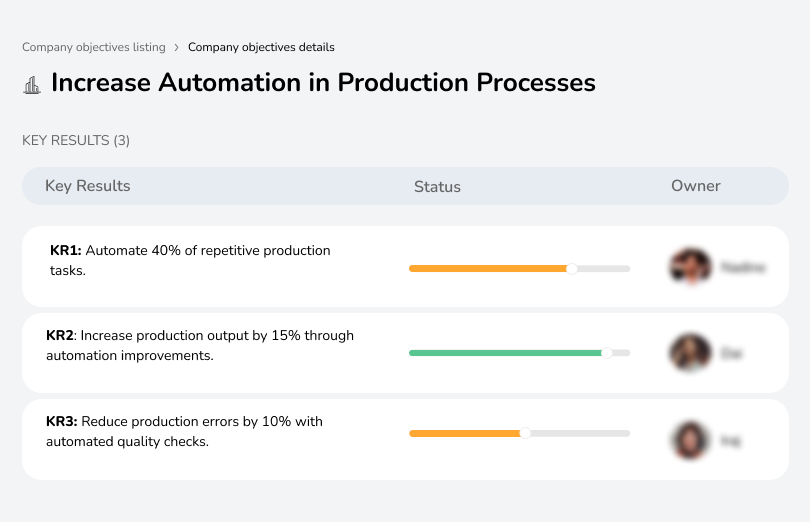Free OKR Templates
Download templatesThe CTO in cement manufacturing is responsible for driving technological advancements and integrating innovative solutions into production and operational processes. By adopting advanced technologies and industry best practices, they focus on improving efficiency, sustainability, and product quality.
This role involves leading research and development initiatives, streamlining manufacturing workflows, and implementing technologies that reduce costs and environmental impact. The CTO works closely with engineering, operations, and sustainability teams to ensure that technological strategies align with the company’s long-term goals.
In cement manufacturing, the CTO is pivotal in enhancing technological capabilities, fostering innovation, and supporting sustainable production practices to maintain competitiveness in a rapidly evolving market.
15 OKR Templates for CTO (Cement Manufacturing)
1. Challenge: Legacy systems hinder efficiency and data-driven decision-making
Objective: Drive Digital Transformation Across Operations
Owned by: CTO
Due date: 6 months
- KR1: Implement cloud-based solutions for 80% of operational processes.
- KR2: Reduce manual data entry tasks by 30% through process automation.
- KR3: Conduct training sessions for 100% of staff on new digital tools.
2. Challenge: Outdated infrastructure limits scalability and performance
Objective: Enhance IT Infrastructure for Scalability
Owned by: CTO
Due date: 5 months
- KR1: Upgrade 90% of hardware and software systems to meet industry standards.
- KR2: Reduce system downtime by 20% through proactive maintenance.
- KR3: Achieve a 15% increase in processing speed for IT systems.
3. Challenge: Rising cyber threats risk data breaches and operational disruptions
Objective: Strengthen Cybersecurity Across the Organization
Owned by: CTO
Due date: 4 months
- KR1: Implement advanced threat detection systems across all networks.
- KR2: Reduce cybersecurity incidents by 25% through enhanced monitoring.
- KR3: Train 100% of employees on cybersecurity best practices.
4. Challenge: Lack of a structured approach delays smart technology adoption
Objective: Develop a Roadmap for Smart Manufacturing Implementation
Owned by: CTO
Due date: 6 months
- KR1: Identify and prioritize 5 key areas for smart manufacturing integration.
- KR2: Develop a 3-year strategic plan for smart factory deployment.
- KR3: Pilot at least 2 smart manufacturing projects in high-priority areas.

5. Challenge: Limited use of data analytics reduces operational insights
Objective: Improve Data Analytics Capabilities for Decision-Making
Owned by: CTO
Due date: 5 months
- KR1: Deploy advanced analytics tools to track 100% of key production metrics.
- KR2: Train 50% of teams to use analytics dashboards effectively.
- KR3: Achieve a 20% reduction in decision-making time through analytics-driven insights.

6. Challenge: Disconnected teams lead to inefficiencies in technology implementation
Objective: Foster Collaboration Between IT and Engineering Teams
Owned by: CTO
Due date: 4 months
- KR1: Conduct monthly cross-functional meetings to align on IT projects.
- KR2: Develop a shared platform for IT and engineering task tracking.
- KR3: Resolve 90% of IT-related issues for engineering within 48 hours.

VP of Sales (Manufacturing) Templates: Click here
7. Challenge: Low adoption of green tech impacts sustainability goals
Objective: Increase Adoption of Green Technology Solutions
Owned by: CTO
Due date: 6 months
- KR1: Integrate energy-efficient systems into 75% of facilities.
- KR2: Reduce carbon emissions from IT operations by 15%.
- KR3: Achieve a 10% reduction in energy consumption through smart technology.
8. Challenge: Inconsistent technology creates inefficiencies and higher costs
Objective: Standardize Technology Across All Locations
Owned by: CTO
Due date: 5 months
- KR1: Audit and align technology standards for 100% of locations.
- KR2: Replace 20% of non-standard equipment with uniform solutions.
- KR3: Train local IT teams to maintain new technology standards.
9. Challenge: Reactive maintenance increases downtime and costs
Objective: Enhance Predictive Maintenance Systems
Owned by: CTO
Due date: 6 months
- KR1: Implement predictive maintenance solutions for 50% of machinery.
- KR2: Reduce unplanned downtime by 25% through predictive alerts.
- KR3: Monitor and analyze 100% of maintenance data using AI tools.

10. Challenge: Lack of a clear investment strategy slows innovation
Objective: Develop a Long-Term Technology Investment Strategy
Owned by: CTO
Due date: 5 months
- KR1: Identify top 3 technology investments for the next 5 years.
- KR2: Allocate 20% of the annual budget to innovation-focused projects.
- KR3: Present the strategy to the board and gain 100% approval.

11. Challenge: Manual processes limit production efficiency and scalability
Objective: Increase Automation in Production Processes
Owned by: CTO
Due date: 5 months
- KR1: Automate 40% of repetitive production tasks.
- KR2: Increase production output by 15% through automation improvements.
- KR3: Reduce production errors by 10% with automated quality checks.
12. Challenge: Inconsistent vendor performance affects project timelines
Objective: Strengthen Vendor Relationships for IT and Technology Supplies
Owned by: CTO
Due date: 4 months
- KR1: Develop a vendor evaluation framework for 100% of technology suppliers.
- KR2: Sign long-term agreements with top 3 high-performing vendors.
- KR3: Achieve a 20% reduction in technology procurement delays.








